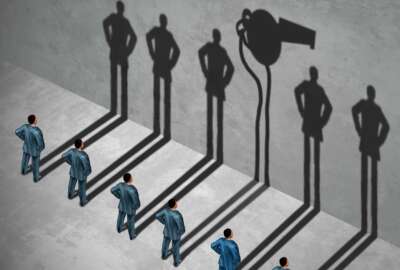

In the first event of its kind, the oversight community touted the importance of whistleblowers and their contributions in combating waste, fraud and abuse at a...
To commemorate National Whistleblower Appreciation Day this year, the oversight community is trying to send a message to those who speak out against agency waste, fraud and abuse: “We hear you, and we value you.”
“For those of us who do oversight work, they are our eyes and ears,” Michael Horowitz, Justice Department inspector general and chairman of the Council of Inspectors General on Integrity and Efficiency, said during an Aug. 1 National Whistleblower Appreciation Day event on Capitol Hill.
July 30 marked the official date of this year’s appreciation day. The Senate has passed resolutions since 2012 encouraging agencies to recognize whistleblowers and the contributions they’ve made.
But this year, agencies are responding a little differently.
“This is the first time that we have seen folks in the Executive Branch make Whistleblower Appreciation Day this much of a priority in this way and recognize the contributions of whistleblowers,” said DeLisa Lay, counsel for Sen. Chuck Grassley (R-Iowa). Grassley is a co-founder and chairman of the Senate Whistleblower Caucus.
2015 was a big year for the whistleblower community. The number of disclosures made to the Office of Special Counsel has more than doubled over the past six years, and the agency’s caseload has risen more than 50 percent, Carolyn Lerner, OSC Special Counsel, said. About 175 employees whose agencies retaliated against them received help from OSC in 2015.
“We see these increasing numbers in a very positive light,” Lerner said. “It shows that whistleblowers are more confident in OSC. We think that they know that now if they come forward, they will be protected from retaliation.”
In general, more employees are beginning to reach out to their agencies with examples of wrongdoing, the oversight community said. The Justice Department’s inspector general hotline receives more than 10,000 calls every year, Horowitz said.
“We’re usually not the first stop,” he said. “They come to us because their own organization doesn’t listen, isn’t willing to listen, or sloughs them off as troublemakers or not sufficiently with the program. And that’s wrong.”
Horowitz said his DoJ office is meeting with members of the House and Senate whistleblower caucuses, as well as components within the department, to educate employees, contractors and grant recipients about whistleblower issues and to “demonstrate the importance of a culture that is inclusive and allows people to be heard.”
As the number of complaints continues to grow, DoJ is in the process of officially reminding employees and contractors of their rights to speak to the IG, Horowitz said.
The DoJ OIG is also training FBI employees on whistleblower protections and guidelines. The training program began last summer, but the agency recently expanded it and made the program mandatory for all FBI employees. Few educational programs are mandatory for the FBI workforce, DoJ said, because the bureau’s employees can often test out of some training classes.
“Show them the importance of whistleblowing,” FBI Director James Comey said. “Show them the regulations. Show them the laws, the rules that forbid retaliation. Show them the structure that is designed to encourage people to raise their hand.”
Comey said he sees a great importance in talking about whistleblowers and the value they bring to an organization, and as a leader, he wants to make that opinion known.
“It’s important that you provide opportunities for people to watch and to see you,” he said. “That’s the [other] reason I came here today. I want my organization to know that I came. Because they will talk about that. Even without me having to explain the meaning of it, they will derive meaning from it.”
The FBI is having more discussions with its employees about embracing humility, a lesson Comey said he considers daily as a leader.
“I have to begin and end each day with the recognition that I may not even perceive in my consciousness facts that are different from what I already believe,” he said. “That instead, I will drink in, suck in facts that support my preconceptions and my biases.”
For Comey, his goal is to build a culture within the FBI that fosters humility and confidence.
“We have explained to the organization we’re looking for leaders who are confident and humble,” he said. “[It} seems like an odd combination. But the reason it’s so important is the best leaders are people who are comfortable enough in their own skin to shut up and listen. That requires confidence.”
“It’s OK to be wrong,” Comey added. “Be sorry, be unbelievably heartbroken … but embrace being wrong, and then find ways to get better. That is the path to greatness. You’ll never actually get to true excellence, but you will get closer and closer with an attitude of humility.”
Copyright © 2025 Federal News Network. All rights reserved. This website is not intended for users located within the European Economic Area.
Nicole Ogrysko is a reporter for Federal News Network focusing on the federal workforce and federal pay and benefits.
Follow @nogryskoWFED


